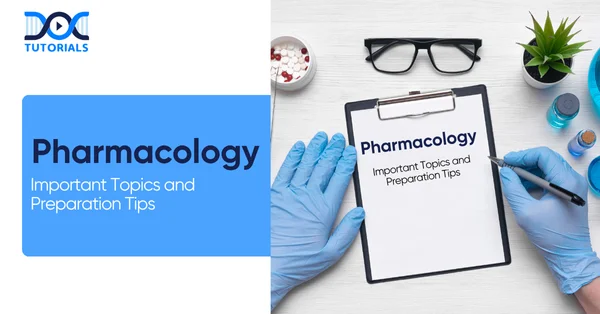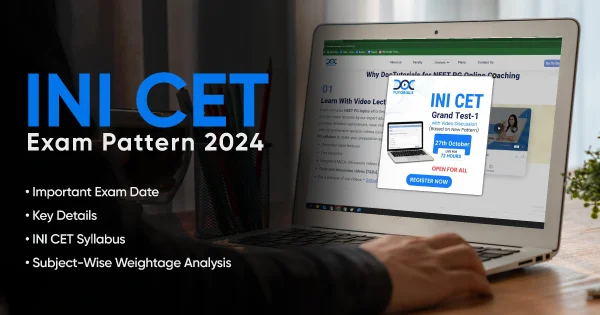Pharmacology: Important Topics and Preparation Tips

Pharmacology, the scientific study of how drugs interact with living systems, forms a crucial part of the NEET PG syllabus. From understanding the biological effects of medications to exploring new drug targets and designing therapies to prevent or treat disease, pharmacology bridges theory and clinical practice. For MBBS students who are preparing for NEET PG, it is not merely memorisation of drug names but understanding the mechanism of action, indications, side effects, and principles of rational prescribing.
With such a diverse syllabus, emphasis on high-yield areas and assimilating them into a well-crafted, time-orientated study plan will go a long way in the exam performance. In this guide, we shall discuss the most important pharmacology topics and share tried-and-tested tips for maximising your preparation for NEET PG.
Subject Weightage for NEET PG Pharmacology
According to the recent trend of NEET PG, the exam is separated into three sections – A, B, and C. Section A consists of 50 questions, Section B consists of 100 questions, and Section C consists of 150 questions. The marking scheme for all three sections is the same. Pharmacology comes under Section B and consists of 20 questions, which totals a cumulative weightage of 80 marks in NEET PG 2025.
Key Topics of Pharmacology for MBBS Students
Pharmacology is detailed and descriptive, but is still one of the top-scoring papers. It is necessary to read the entire syllabus once, but marking down the high-yield points will make your preparation worthwhile and efficient. These are the key areas for MBBS students to cover for NEET PG 2025:
- General Pharmacology
- Concept of Bioavailability – its clinical importance and how to calculate bioavailability
- First-Pass Metabolism
- PC-T Graph
- Factors affecting volume of distribution
- Routes of drug administration
- Plasma protein binding
- CYP substrates, inducers, inhibitors
- Bioavailability and Dose response curve graphs
- Drug antagonism types and examples
- Competitive vs. non-Competitive antagonism
- Drug schedules, essential medicines, FDC, TDM
- First- and zero-order kinetics
- Phases of clinical trials (aim, participants and type of study)
- Different types of receptors & which drugs act upon which receptors
- Receptor location, second messenger and examples
- Major teratogenic drug list
- PK problems
- Clinical trials
- Practicals including prescription
- ANS
- Basic architecture and functions of the divisions of ANS
- Uses of cholinergic drugs
- Management of OP, Carbamate and atropine poisoning
- Drugs acting at the neuromuscular junction
- Drugs used in Myasthenia Gravis and Alzheimer’s disease
- Atropine and glycopyrrolate
- Drugs used in bladder conditions (overactive bladder and BPH)
- Adrenaline, noradrenaline, and dopamine in detail
- Receptors of the sympathetic and parasympathetic system
- AChe inhibitors, including OP poisoning
- Uses of anticholinergic drugs and poisoning
- Use of adrenaline, noradrenaline, and dopamine
- Beta-blockers (cardio-selective vs. non-selective)
- Contraindications of beta blockers
- Prazosin uses and adverse effects
- Anti-glaucoma drugs
- Anti-obesity drugs
- Autacoids
- Difference between first- and second-generation antihistamines
- Drugs for Migraine (attack and prophylaxis)
- Antihistaminics (1st vs 2nd generation)
- Antihistamine causing QT prolongation
- Prostaglandin preparation and uses
- Contraindications of Prostaglandin preparations
- 5-HT receptors
- NSAIDs: PCM and aspirin in detail
- Drugs for gout (acute vs. chronic)
- Drugs for RA
- DMARDs (mainly the mechanism of action)
- Renal Pharmacology
- Mechanism and site of action of diuretics
- Adverse effects of loop, thiazides and spironolactone
- DOC in various oedema conditions
- Contraindications of mannitol
- Tolvaptan
- Uses of desmopressin and terlipressin
- CVS
- Difference between ACE inhibitors and ARBs
- Reason for angioedema and dry cough with ACE inhibitors
- Contraindications of ACE inhibitors
- Drugs decreasing mortality in chronic CHF
- Basic concepts and drugs in acute and chronic CHF
- Digoxin in detail
- Nesiritide
- Nitrates mechanism of action in angina
- Nitrates plus sildenafil
- Calcium channel blockers (DHPs vs. Non-DHPs)
- Newer drugs in angina pectoris
- First-line antihypertensive drugs
- Drugs used in a hypertensive crisis
- Antihypertensive drug mechanisms and major adverse effects
- Antihypertensive drugs contraindicated in pregnancy
- Drugs used in pulmonary hypertension
- Classification of antiarrhythmics
- DOC for various arrhythmias
- Amiodarone in detail, particularly the adverse effects
- Nitrates
- New drugs for angina
- Mechanism and names of anti-arrhythmic drugs
- Statins and new anti-dyslipidemic drugs
- Endocrine
- Bromocriptine and cabergoline uses
- Uses of octreotide
- Drugs used in acromegaly
- Uses of GnRH agonists and antagonists
- Uterine relaxants and stimulants
- Propylthiouracil and carbimazole difference
- Insulin preparations
- Metformin in detail
- Anti-diabetic drugs – MOA, effect on glucose, weight and routes of administration
- SGLT2 Inhibitors: adverse effects
- Teduglutide, Sotagliflozin, tirzepatide and saroglitazaar
- Adverse effects and contraindications of corticosteroids
- Steroids use in preterm labour and CAH
- Drugs to treat Cushing’s disease
- Bisphosphonates: MOA, USES and A/E
- Bone-forming and resorbing agents
- Drugs used for BPH, erectile dysfunction, premature ejaculation and prostate cancer
- SERM, SERD and aromatase inhibitors
- Tamoxifen in detail
- Mifepristone, clomiphene citrate
- Osteoporosis
- CNS
- Difference between benzodiazepines and barbiturates
- Management of benzodiazepines and barbiturates poisoning
- Benzodiazepines safe in liver disease patient
- Orexin antagonist and melatonin agonist
- Types of seizures and DOC
- Valproate, phenytoin, carbamazepine, topiramate and lamotrigine in detail
- Mechanism of action of anti-epileptic drugs
- Drugs in alcohol, smoking and opioid de-addiction
- Lithium in detail
- Difference between typical and atypical antipsychotics
- Adverse effects of typical antipsychotics, particularly extrapyramidal symptoms and management
- Clozapine, risperidone, aripiprazole in detail
- Drugs used in Parkinson’s, Alzheimer’s, Huntington’s and amyotrophic lateral sclerosis
- Advantages and disadvantages of levodopa and carbidopa combination
- SSRIs use and adverse effects
- Antidepressants causing sexual dysfunction
- Morphine uses, contraindications and poisoning
- Morphine vs. Pethidine
- Tramadol and methadone speciality
- Drugs used in neuropathic pain
- Haematology
- Warfarin and Heparin
- Basic mechanism of antiplatelet drugs
- Newer oral anticoagulants
- Drugs Affecting Blood and Blood Formation
- Mechanism of action of anticoagulants, adverse effects, antidote and lab monitoring
- Anticoagulants in pregnancy
- NOACs/DOACs
- Mechanism of action of antiplatelet drugs
- Clopidogrel and CYP2C19
- Management of acute and chronic iron overdose
- Fibrinolytics and antifibrinolytics
- Mechanism of action, uses, and adverse effects of statins, fibrates and Niacin
- Respiratory System
- Drugs used for prophylaxis and attack of asthma
- MOA-Montelukast, omalizumab, cromoglycate
- Bronchodilators
- Adverse effects of salbutamol
- New drugs in asthma and COPD
- Drugs used in dry and productive cough
- Bronchial asthma
- Peptic ulcer
- Anti-emetic drugs
- GIT
- Metoclopramide and dystonia management
- DOC for CINV, morning sickness and motion sickness
- PPIs – MOA and uses
- H.pylori eradication regimen
- Antimicrobials
- Mechanism of action of antibacterial drugs
- Major bacterial infection (DOC/First choice)
- Anti-bacterial: cidal and static
- Adverse effects of antibacterial drugs
- Anti-bacterial safe in pregnancy, children, and renal failure
- Drugs used in STIs and prophylaxis
- First-line anti-TB drugs in detail (HRZE)
- Bedaquiline in detail
- Second-line TB drugs
- Definition of MDR, pre-XDR and XDR TB
- Leprosy treatment regimen and management of lepra reaction
- List of ineffective antimicrobials in certain infections
- Metronidazole in detail
- DOC for Helminthic Infections
- Mechanism of antifungals and DOC for systemic fungal infections
- MOA of oseltamivir
- Drugs used for COVID management
- DOC for HSV, VZV, CMV, Hepatitis B and C
- MOA and adverse effects of Anti HIV drugs
- Treatment and prophylaxis of HIV and treatment of opportunistic infections in HIV patients
- Malaria treatment and prophylaxis
- Chloroquine and primaquine in detail
- Anticancer and IS
- Common adverse effects of anti-cancer drugs and their treatment/prevention
- Mechanism of action of anti-cancer drugs
- Cell cycle and non-cell cycle-specific anti-cancer drugs
- Cyclophosphamide, cisplatin, 5-fluorouracil, and vincristine (in detail)
- Methotrexate in detail
- Small molecule inhibitors and Monoclonal antibodies in anticancer therapy
- Immune checkpoint inhibitors in anticancer therapy
- Mechanism of action of immunosuppressant drugs
- Calcineurin inhibitors
- Adverse effects of cyclosporine
- Miscellaneous
- Treatment of Hyperkalemia
- Tricyclic antidepressants
- Antidotes for various drugs
All of the above topics are NEET PG high-yield and most commonly asked in MBBS pharmacology exams. Focusing on these areas will maximise your chances of achieving high scores in pharmacology.
Tips to Score High in Pharmacology in NEET PG
Scoring well in pharmacology for NEET PG demands a structured, rigorous, and planned preparation. Even though the topic may seem daunting because of the large number of drugs, mechanisms, and clinical uses, effective preparation methodologies can increase the chances of a higher score. Here are some tried-and-tested strategies to strengthen your pharmacology preparation and maximise your exam performance:
- Familiarity with Drug Classifications
Most of the NEET PG pharmacology questions are derived from various classes of drugs. Every class of drug has its action, therapeutic application, side effects, and interactions. Keeping yourself familiar with these classes will enable you to respond to questions in the examination without any hassle.
Key Areas to Focus On:
- Drug groups and their prototype drug identification.
- Action and therapeutic applications of every class of drug.
- Key drug interactions, doses, and side effects.
- Clinical Scenario-Based Practice Questions
Pharmacology is not merely recollecting drug names or mechanisms; it is using this information in clinical scenarios. NEET PG also tries to examine aspirants with case-based questions requiring practical application and decision-making skills. Clinical scenario practice is the key to linking pharmacological principles with actual patient management.
Clinical Scenario Practice Tips:
- Apply filters such as “clinical-based questions” on the web to concentrate on case studies.
- Practise case-based questions immediately after covering a particular topic to enhance understanding.
- Take advantage of question banks containing clinical situations from learning platforms like DocTutorials.
- Observe Adverse Drug Reactions (ADRs)
Adverse Drug Reactions (ADRs) are crucial in pharmacology preparation, as they come very frequently in NEET PG. ADRs are not only useful in scoring but also of utmost importance in patient safety in clinical practice. Allowing enough time for learning ADRs will provide you with a huge advantage in the exam.
Points on ADRs:
- Prioritise frequent ADRs to frequently prescribed drugs.
- Mark the mechanisms and prevention involved.
- Practise ADR-based questions on a day-to-day basis to enhance recall and application.
- Develop Concept Maps for Better Understanding
Pharmacology is a subject with different interconnected concepts, i.e., drug-receptor interactions, physiologic effects, and clinical application. The development of concept maps or flowcharts is an effective method for reducing these complicated relationships. Visualisation of drug classes and interrelations enhances memory and provides a better understanding for quick revision.
How to Construct Good Concept Maps:
- Begin with an overall drug class at the map’s top.
- Divide it into subgroups and single drugs.
- Include flowcharts and diagrams following the topic-specific video lectures.
- Employ Flashcards for Quick Review
Flashcards are very useful in revising rapidly and systematically. They enable you to summarise your learning on the move, during breaks, or in between learning sessions. Regular use of flashcards aids memorising crucial drug details, mechanisms, indications, and side effects with ease.
Advantages of Flashcards:
- Rapid and organised revision of main points.
- Easy access anytime, anywhere, making them ideal for short study sessions.
- Pre-PG websites, like DocTutorials, offer a vast range of clinical flashcards to practise and rehearse knowledge.
- Revise Regularly to Retain Information
Consistent and systematic revision is the key to performing well in pharmacology. Completing the syllabus once is insufficient; repeated revision ensures long-term retention and reduces errors during the exam. Scheduling multiple rounds of review and focusing on weak areas can greatly improve your performance.
Best Revision Strategies:
- Attempt to revise 2–3 times a week for optimal retention.
- Identify high-yielding topics during every revision session.
- Attempt wrong-answer questions to gain confidence and understand concepts.
FAQs about Pharmacology Topics for MBBS/NEET PG
- What are the most important subjects to concentrate on in pharmacology for NEET PG?
The high-yielding topics are drug administration, autonomic nervous system drugs, cardiovascular drugs, gastrointestinal agents, antimicrobials, and endocrine-related drugs. Concentrating on these subjects means more preparation and scoring possibilities.
- How much time should I dedicate to MBBS pharmacology in my study schedule?
It is advisable to devote 15–20% of your total study period to pharmacology. This should be a time for regular revisions, MCQ practice, and practice of clinical scenario-based questions to solidify the concept.
- How significant are clinical applications and case studies in pharmacology?
Clinical cases and scenarios are very important in preparing for NEET PG. They assist in building knowledge regarding the real use of drugs, their impact on patients, and clinical decision-making. The examination is typically evaluated clinically through scenario-based questions, and, therefore, practice is vital to perform well.
- How can I make flashcards useful for MBBS pharmacology revision?
Flashcards are ideal for quick, organised review of drug details, mechanisms, and adverse effects. They allow you to study efficiently during short breaks, commuting, or any time you have a few minutes to spare.
- What are the most common errors to avoid when learning MBBS pharmacology?
Common mistakes to avoid while studying pharmacology include relying only on rote memorisation without truly understanding the concepts, which hampers long-term retention. Additionally, ignoring updates on new drugs and guidelines, as well as neglecting sufficient practice with MCQs and clinical scenarios, can leave you underprepared for both revision and the NEET PG exam.
Conclusion
Pharmacology plays a vital role in NEET PG preparation, and mastering its high-yield topics can significantly boost your exam performance. With an understanding of the mechanism of drugs, indications, side effects, clinical applications, and regular practice of scenario-based questions, you can make this vast subject a scoring point. Strategic revision through concept maps, flashcards, and quality question banks makes for better retention as well as quick recall during exams.
For NEET PG aspirants who want structured guidance and comprehensive practice, DocTutorials offers expert-curated content, extensive question banks, and effective study strategies for MBBS pharmacology. Leveraging DocTutorials can make your prep streamlined and maximise your scoring ability. What’s more, whether you are in MBBS 1st year, 2nd year, or 3rd year, we have tailored courses to fulfil your preparation needs.
MBBS Pharmacology simplified by DocTutorials!
Latest Blogs
-

INI CET Exam Pattern 2025: A Complete Guide with Subject-Wise Weightage
The Institute of National Importance Combined Entrance Test (INI CET) is your key to entering some of the most prestigious…
-

NEET PG Registration 2025: An Essential Guide For Exam Prep
The NEET PG registration, which is conducted online, is a crucial step in the exam process. Filling out the NEET…
-

NEET PG Syllabus 2026: A Must-Have Complete Guide for Exam Success
The NEET PG Syllabus acts as one of the foundation stones for aspiring postgraduate medical students like you who are…




